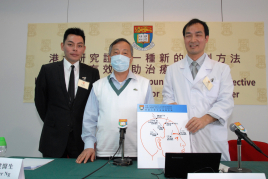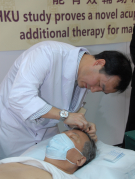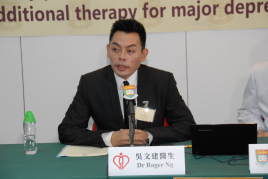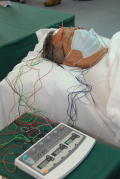Media
HKU study proves a novel acupuncture to be an effective additional therapy for major depressive disorder
29 Mar 2012
Major depressive disorder (MDD) is a common mental health problem. Hong Kong is a metropolitan with high prevalence of depression and other mood disorders. The currently available antidepressant treatments, represented by selective serotonin reuptake inhibitors (SSRIs), are unsatisfactory, particularly with the delay in the onset of action of SSRIs, body weight disturbance and other adverse effects. As a safe traditional therapy with minimal adverse effects, acupuncture has been widely used for the treatment of various psychiatric disorders, including depression. Recently, the School of Chinese Medicine at The University of Hong Kong Li Ka Shing Faculty of Medicine and the Department of Psychiatry in Kowloon Hospital have completed a clinical randomised controlled trial of a novel acupuncture "dense cranial electroacupuncture stimulation (DCEAS)" in patients with MDD. The results of the study have demonstrated that DCEAS can rapidly reduce the severity of depressive symptoms, providing an additional option for depressed patients.
School of Chinese Medicine of HKU has long been engaged in modern research of traditional Chinese medicine with evidence-based approaches. This clinical study was the first to apply rigorous randomised controlled design to examine the effectiveness of DCEAS. The study has been published in the free-access Journal PloS ONE.
Acupoints and neural acupuncture unit
Dr. ZHANG Zhang-jin, Associate Professor of the HKU School of Chinese Medicine, suggests the new concept "neural acupuncture unit" (NAU), which explains the therapeutic benefits of acupuncture. NAU is defined as the collection of the activated neural and neuroactive components surrounding the inserted needle. According to Dr. ZHANG, the traditional acupoints represent an anatomical landmark system that indicates local sites where NAUs may contain relatively dense and concentrated neural and neuroactive components, upon which acupuncture stimulation would elicit a more efficient therapeutic response. DCEAS could more efficiently stimulate the release of serotonin (5-HT) and other chemicals in the brain, resulting in better treatment outcomes.
Dense cranial electroacupuncture stimulation (DCEAS)
DCEAS is a novel acupuncture treatment strategy, which was developed by Dr Zhang Zhang-jin based on modern neuroanatomical rationale and neural acupuncture unit.
According to Traditional Chinese Medicine, stimulating acupoints of the head can boost brain power, regulate yin yang and relieve depression. Traditionally acupoints Bai Hui and Yin Tang are used to treat depression. In DCEAS, Dr Zhang believes that stimulating Bai Hui and Yin Tang, together with other acupoints including Si Shen Cong, Tou Lin Qi, Tai Yang, Shuai Gu and Tou Wei, can stimulate the release of serotonin (5-HT) and other chemicals in the brain more efficiently, resulting in better treatment outcomes.
Methodology
A total of 73 participants aged 25-65 years volunteered in the study. All of them were diagnosed to have MDD and suffered from MDD for several months to several years.
While continuing their existing antidepressant medications (Fluoxetine), they were randomised to DCEAS group) or control group, Patients in the DCEAS group received dense cranial electroacupuncture stimulation, while the control group received non-invasive electroacupuncture (placebo acupuncture) for 9 sessions in 3 weeks, each session lasted for 45 minutes.
Methodology
Clinical assessment conducted by both physicians and patients themselves revealed that the patients receiving DCEAS had greater improvement in depressive symptoms. During day 21 after receiving the treatment, DCEAS group experienced a greater decrease in the clinical assessment (difference of the two groups' HAMD-17 scores is 2.39) and the self-rating depression scale is also greater (difference of the two groups' SDS scores is 4.68). DCEAS intervention also produced a higher rate of clinical significant response compared to the control group (19.4% vs 8.8%).
Besides, a greater improvement was observed in DCEAS group as early as at Day 3, and the improvement lasted till the end of the treatment. No significant adverse events occurred during the study.
Implications
The results suggested that DCEAS is safe and effective, which can be considered as an additional treatment for depressed patients in order to achieve better clinical outcomes.
The study was conducted by the research team led by Dr ZHANG Zhang-jin, Associate Professor of HKU School of Chinese Medicine, in collaboration with Dr Roger NG Man-kin, Chief of Service, Department of Psychiatry of Kowloon Hospital and his colleagues. The study was supported by the Health and Health Services Research Fund.
Other related studies
Another clinical trial supported by Research Grant Council is being conducted to explore the brain mechanisms for DCEAS treatment of depression, with the employment of positron emission topographic (PET) and functional magnetic resonance imaging (fMRI) techniques. For details, please call Mr. MAN or Mr. HUNG (6351 9949)
(From left) Dr Roger NG Man-kin, Chief of Service, Department of Psychiatry, Kowloon Hospital; Mr NGAI, patient who receives acupuncture therapy for major depressive disorder; and Dr ZHANG Zhang-jin, Associate Professor, School of Chinese Medicine, The University of Hong Kong Li Ka Shing Faculty of Medicine
Dr Roger NG Man-kin, Chief of Service, Department of Psychiatry, Kowloon Hospital, explains the limitations of the current medications for major depressive disorder.




